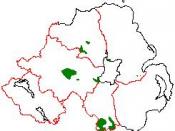Translations although addressing a quite distant past evokes many different and emotional reactions because of the text's relevance to the issues of a much closer past and the situation in Northern Ireland even today. The play takes on a large responsibility by addressing a past which is held so close to people's hearts. The tension that this causes within in play evokes a variety of different responses.
The play makes use of historical landmarks to engage the audience giving them a place in history to relate to. They are also used for dramatic irony, Maire remarks 'Sweet God did the potatoes ever fail in Baile Beg? ' She talks about how people sniff around for disaster waiting for the potato crop to fail. The audience knows the play is only set a few years prior to the potato famine. This thought is with us all the way through the play.
It adds a sense of futility to their lives and their actions because whatever attempts are made to save this culture or the Gaelic language inevitably the potato famine among other things, will take everything away from them.
The actors are representing people in a world that we can never actually know. It is an exaggerated, optimistic view of the past. The text is reluctant to accept the decline of Gaelic. The fact that the play is written and performed in English and that there is more Latin and Greek in the play than Gaelic emphasizes the fact that without the change in culture, the decline of Gaelic and eventually the progression of Ireland, Irish writing and writers would not have been known. The play is more sentimental that realistic, what the play is mourning is actually responsible for its existence.
This sentimentalism evokes two reactions, the first is mourning,


